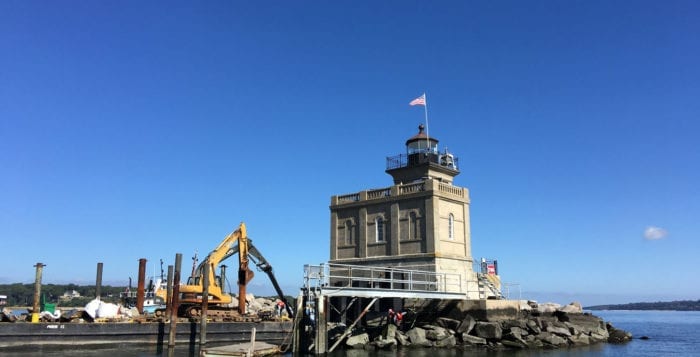New foghorn proposal has Huntington boaters sounding off

A proposed plan to change the foghorn at Huntington Lighthouse is already raising alarm among North Shore boaters.
The U.S. Coast Guard is awaiting final approval to switch out the lighthouse’s foghorn from the current automated system to a new boater-operated model. Shifting the responsibility for operation of this essential safety device to the watercraft owners has raised objections from both residents and Huntington Town officials.
“This is not something that should be installed here at all due to the nature of the boating community,” said Pamela Setchell, president of the Huntington Lighthouse Preservation Society. “The Town of Huntington encompasses five harbors and 5,000 boaters. A lot of those 5,000 boaters are inexperienced.”
The lighthouse’s foghorn is currently activated by a sensor, according to Mark Williams, officer in charge of the Aid and Navigation Team for the Long Island Sound. Williams said the sensor sends out a signal that measures for half-mile distance, if fog or other weather conditions cause visibility drops below a half-mile the foghorn will activate and sound until it clears.
The Coast Guards’s plan is to switch this sensor-activated system out to a new Marine Radio Activated Sound System, known as MRASS for short, in 11 lighthouses overseeing the Sound is an attempt to save time and money on maintenance. In addition to Huntington, other locations on the list include Montauk Point and Orient Point.
“The equipment out there is old, antiquated and almost impossible to find replacement parts for now,” Williams said. “We are going with a new system that the U.S. Coast Guard has tested and approved.”
The MRASS system requires a lighthouse’s foghorn to be activated by boaters with a
Marine Very High Frequency Radio, commonly referred to as a VHF radio, by turning to the 83A frequency and touching the key, which activates the radio fives times, equally spaced apart. Once this signal is received, Wiliams said the lighthouse’s foghorn will sound for the next 30 minutes.
Both Williams and Setchell agree that Huntington Lighthouse is distinctive and unique compared to the many other lighthouses where the new foghorn is proposed, given its close proximity to residential communities and services mostly recreational boaters.
Setchell said as an experienced boater that she fears the new foghorn could be problematic as watercraft owners are not required to have a VHF radio onboard under New York state law — and some recreational boaters don’t. Also, her concern is it places the burden of raising alarm on an individual already in distress.
“When you are lost in the fog in a boat, it’s frightening because you have no idea where you are,” she said. “To sit there and think an inexperienced boater will have the wherewithal and calm to grab their VHF radio, remember to go to 83A, and key the mike five times is ridiculous.”
Williams admitted there is no requirement for boaters to own a VHF radio, but it is highly encouraged.
“There might be small boaters who don’t have anything,” he said. “But we hope vessels of that size with little equipment are not out in the fog or restricted visibility weather.”
Setchell said the residents near the lighthouse, along with the boating community, fear a user-operated system could become the “focus of pranks” by drunken or irresponsible parties. If the signal is keyed in repeatedly, the foghorn will continue to sound for a full 30 minutes from the last time it was activated — with no immediate shutoff.
Huntington Town officials have raised their own concerns about whether changing the foghorn system is in the best interests of the boating community.
“The town shares the Huntington Lighthouse Preservation Society’s concerns about whether a boater-operated foghorn is appropriate for an area that is almost exclusively used by recreational boaters,” Supervisor Frank Petrone (D) said in statement. “We look forward to working with the Lighthouse Preservation Society, the Greater Huntington Council of Yacht and Boating Clubs and the Coast Guard to address the issue of a new foghorn that will increase boater safety without unnecessarily intruding on the serenity of those who live along the shore.”
The Town of Huntington has filed a letter with the U.S. Coast Guard outlining its concerns for consideration before the plan is approved.
The same MRASS foghorn plan was proposed for the Huntington Lighthouse in 2009, according to Setchell, but was tabled due to overwhelming public objection after less than a week.
The system has been widely installed across northern New England, according the Williams, with very few complaints.
Any individual or organization who either supports or has concerns about the proposed foghorn replacement can write to the U.S. Coast Guard by sending an email to [email protected].






